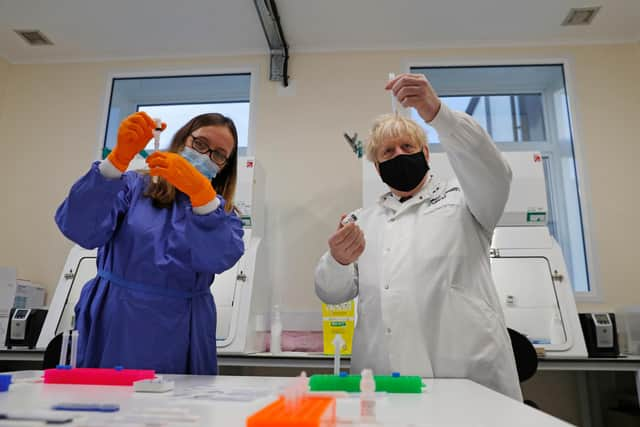Vaccine testing at Porton Down to be expanded under plans to keep UK ‘one step ahead of Covid’
and live on Freeview channel 276
Laboratories to test existing and new vaccines against variants of concern will be built in Wiltshire, the government has confirmed.
The £29.3 million investment will help scientists test 2,700 more variant samples per week – more than quadruple the current number.
Advertisement
Hide AdAdvertisement
Hide AdTests on blood samples can help scientists monitor the effectiveness of the coronavirus vaccines.


Health Secretary Matt Hancock said testing facilities at Porton Down will help stay “one step ahead” of Covid.
Mr Hancock said: “We’ve backed UK science from the very start of this pandemic and this multi-million pound funding for a state-of-the-art vaccine testing facility at Porton Down will enable us to further future-proof the country from the threat of new variants.”
Double testing capacity
Current testing capacity is 700 tests a week but the Department of Health and Social Care (DHSC) said this will increase to 1,500 by January 2022 – backed with a previous £20 million investment.


Advertisement
Hide AdAdvertisement
Hide AdThe DHSC said a further £29.3 million investment will more than double the capacity for testing variant samples to 3,000 per week when the work is completed.
Dr Jenny Harries, chief executive at the UK Health Security Agency (UKHSA), said: “A new variant that can escape the current vaccines is the greatest risk of a third wave.
“This new investment will help us stay one step ahead of the virus by doubling our capacity to test vaccine effectiveness against emerging variants.”
Foreign holidays
The investment comes ahead of the expected lifting of the ban on foreign holidays for people in England from May 17 as part of the next easing of coronavirus restrictions.
Advertisement
Hide AdAdvertisement
Hide AdA risk-based traffic light system will be introduced, with different rules for returning travellers depending on which list their destination is on.
People arriving from a green location will not have to quarantine, while those returning from somewhere on the amber list must self-isolate for at least five days.
The red list requires a 10-night stay in a quarantine hotel at a cost of £1,750 for solo travellers.
The green list for foreign holiday destinations will reportedly be published on Friday, and Government travel advice gives an indication of which destinations could be on it.
Advertisement
Hide AdAdvertisement
Hide AdTourists visiting a number of popular summer hotspots do not face a level of risk for coronavirus that is “unacceptably high”, according to the latest updates from the Foreign, Commonwealth and Development Office (FCDO).
The FCDO is not advising against non-essential travel to Portugal (excluding the Azores), Spain’s Canary Islands or the Greek islands of Rhodes, Kos, Zante, Corfu and Crete.
Downing Street has admitted the NHS app may not be ready for use as a vaccine passport when international travel resumes.
Holidaymakers visiting most popular foreign destinations will be required to show evidence that they have been vaccinated, received a recent negative test or have coronavirus antibodies.
Advertisement
Hide AdAdvertisement
Hide AdTransport Secretary Grant Shapps has previously said the NHS app – which is currently used to book medical appointments and order repeat prescriptions – will be able to display evidence that someone in England has been vaccinated or tested.
But the Prime Minister’s official spokesman indicated that officials are working on alternative plans for when international travel resumes.
“Mr Shapps set out the approach we are looking to take,” the spokesman said.
“Obviously we will be able to confirm ahead of the 17th at the earliest what measures are used for those initial countries that are available for travel, be it the app or another approach.”
Advertisement
Hide AdAdvertisement
Hide AdThe spokesman added: “There are other routes to achieving the same end-goal. We are working on the app at the moment, at pace, to have it ready, and we will be able to confirm ahead of the 17th at the earliest what approaches we will be using.”
Meanwhile, campaigners have warned that care home residents are forgoing healthcare appointments because of a requirement to self-isolate for 14 days after leaving the home for certain visits.
John’s Campaign is calling for the requirement, set out in Government guidance, to be urgently scrapped for all visits out, including external medical appointments and overnight stays.
Read more:
Advertisement
Hide AdAdvertisement
Hide Ad